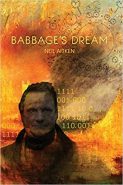
Book Review: Babbage’s Dream by Neil Aitken
Reviewed by Stephanie Barbé Hammer

Babbage’s Dream
Sundress Publications, December 2016
Poems by Neil Aitken
$12.99; 51 pp.
ISBN-13: 978-1939675477
How can poetry make us curious about science and technology? What about the history of computers? Can words both seduce and mystify readers to such an extent that we will willingly Google expressions like “difference machine” while considering the affinities shared by the HAL 9000, the Mechanical Turk, Frankenstein’s Creature, and us? Neil Aitken’s mesmerizing, meticulously researched collection Babbage’s Dream manages this feat through specificity, lyricism, and a continual, heartfelt wonder at the creation and evolution of the computer.
Using biographical details about the mathematician and inventor Charles Babbage as his jumping off point, Aitken favors the couplet (the perfect poetic analog to binary) and the persona poem. These poems immerse us in the dense emotional perspective of Babbage, a man fascinated by computation and volcanoes, and deeply in love with his wife. But they also navigate a complex architecture filled with gears, punch cards, and numbers as well as offering up the world as viewed by the machines themselves.
Aitken announces his ambitious plan early on:
the program is a careful cathedral, an intersection of lines,
the unknown body of the world, our communion, our heap
formed of pattern, code, the burst of light—
here is a history of failures, each no more than the shape of itself. . .
The cathedral as a sacred architecture provides the mainframe for this exploration of relationships, both internal and external—transforming code itself into a space, where magical interactions between numbers and symbols happen. Poem titles like “array,” “short,” “cast,” and “float,” (all computer terms, which Aitken briefly defines) enable the reader to glimpse and feel the lyrical vocabulary at work in this science. The language of computers is beautiful., and surprisingly solid: “every number a thing. Every thing a number.”
Babbage’s Dream investigates the intricacy of the machines that will become computers. In the end it is our deep connection to the machines we have created that we are left to consider, as the famous chess computer Deep Blue observes in its letter to Gary Kasparov: “the truth is harder to bear. I’m really no different/from you…”
Stephanie Barbé Hammer is Professor Emerita of Comparative Literature at the University of California, Riverside. She is the author of three scholarly books, a prose poem chapbook, a poetry collection, and a novel. An award-winning educator, Stephanie teaches creative writing at non-profits, community colleges, and online. She is currently working on a novel about fangirls, right-to-lifers, and suicides, as well as a poetry collection about trying to deal with nature when you’re from Manhattan.

Leave a Reply